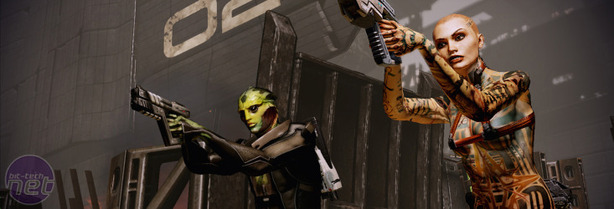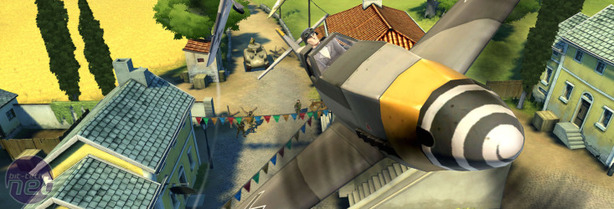
Power-Levelling
The flipside to scaling content - populating the world with all threat levels of monster and telling players to man up when they meet someone tought - is that you can easily end up with a difficulty curve which is completely out of whack.Players of the original Baldur’s Gate will probably all remember the mysterious stranger whose only line of spoken dialogue was, “Hello Friend” before he fired off a magic missile spell at your fragile level one character. For a mage or rogue this had the potential to be one of the hardest fights in the entire game as it was almost certain to do more damage than you could have hit points, arbitrarily killing you to bits.
Then, as is the case with Mount and Blade, once you play through the harshness of life as a low level character suddenly the challenge falls away. You find yourself armed to the teeth, better armoured than a bank vault and with enough knights at your back to reshoot the climactic battle from The Two Towers. If you keep on raising a player's power level pretty soon you run out of places to go with it.
So, is levelling up an inherently broken mechanic? One route is suggested by the STALKER series, which applies incremental upgrades to your guns but not your character. The game demands you improve in order to succeed in the latter stages. The challenge curve goes neatly from fairly easy to relentlessly tough, but at least when the going gets tough you’ve got some custom military hardware to lay down the law with.
A more high profile game to eschew the world of levelling is Mass Effect 2. That is not to say that Mass Effect 2 doesn’t have levels and the other systemic trappings of a traditional RPG, but once you actually get stuck into the game it’s clear that these have been marginalised so ruthlessly that you might be forgiven for barely even noticing them at all. Mass Effect 2 shed the number crunching shell of the original game to fully embrace life as a no holds barred squad based shooter.
Levels in Mass Effect 2 are barely even treated as rewards and while there are unique abilities, they all boil down to being combat upgrades - and as one upgrades is as effective as another, they begin to fade into the background. Gone are the days when you needed a specific skill to get past a certain point. Does this compromise Mass Effect 2 as an RPG? Absolutely not, the leanness of the game mechanics if anything highlights the actual playing of the role rather than picking the right skills and stats. What it does show though is that not only is a complicated character building and levelling system not a vital ingredient for an RPG, sometimes it just gets in the way of saving the universe and getting freaky with aliens, which is arguably what we're all here for. This is underscored by the story, too and the fact that there’s little character transformation for the main character; you don’t start as a lost youth or a fish out of water who becomes a great warrior. You start as a space commando and that’s how the game ends too.
What Mass Effect 2 and indeed most modern games now have however is achievements, and in some ways these serve a similar purpose to levels. With their tendency to reward specific acts and more importantly their entirely peripheral nature to the way the game itself is played it is possible that these might be the way forward. Players are free to choose if they want to pursue these goals but as they do not provide a vital edge in the game they are not forced to chase them.
One system that might replace levelling up is that which has appeared in games such as Battlefield Heroes - as an alternative to earned levels and points to gain better equipment, you have micro-purchases, where, if you spend some cash, you can access the improved kit that in other titles is given to those who are willing to put in the time.
Some MMOs (particularly in the Far East) are entirely financed by this method, as are games on Facebook. While a micro-transaction model might seem dishonest and not in the spirit of gaming isn't it equally arguable that simply having an advantage due to having played longer is equally unfair? Practice might make perfect, but it’s debatable as to whether it ought to get the best weapons and armour too.
DICE's Sebastian views the future of levelling thus, “As technology and gameplay design progresses we'll see more organic ways than numbers to measure a player's progress and provide persistence.”
Game playing is becoming more of a communal thing, for example Bioware have a social network site that shares your Dragon Age and Mass Effect accomplishments with the world, even down to having screenshots of your finest hours, Steam does similar for games on its network with its own achievements, as does Games for Windows. Plenty of MMOs and shooters have had this kind of stat tracking in place for years. Indeed it’s getting more and more difficult to find a game that doesn’t want you to log onto some kind of a network to tell everybody about your sword +1 and that time you stuck it in that orc that was looking at you all funny.
So these organic ways to measure progress that Sebastian mentioned are already appearing, and arguably public profiles and achievements paint a much more detailed and human picture of a gamer's exploits than a simple level number can, and, as they happen outside the game, they do so in a way that doesn't change the game's balance or difficulty. It seems as though the level as an arbitrary measurement of progress, pioneered in those tabletop RPGs all those decades ago, might find itself obsolete even as it reaches its most prevalent, and maybe that’s no bad thing at all.

MSI MPG Velox 100R Chassis Review
October 14 2021 | 15:04











Want to comment? Please log in.